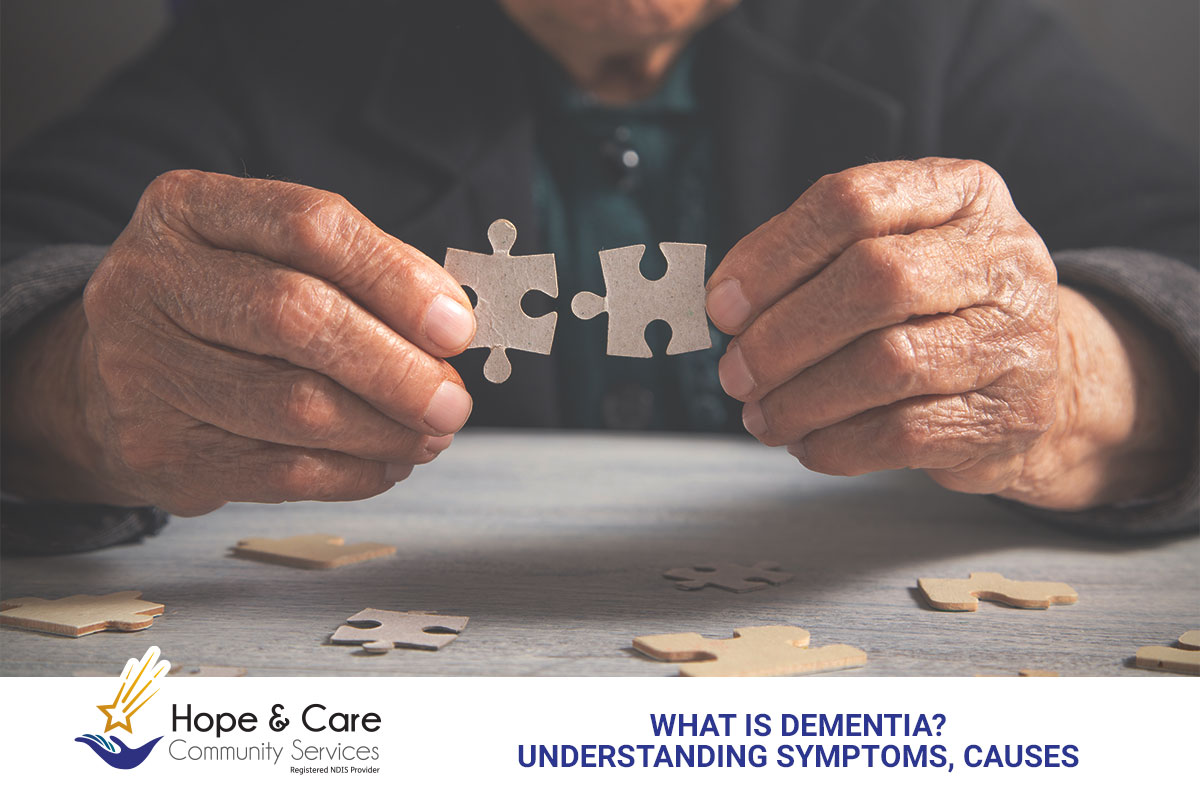
Dementia is one of the leading health challenges affecting older Australians, but it is also a condition that can impact people under 65 through younger onset dementia.
It describes changes in memory, thinking and behaviour that interfere with daily living. The most common cause is Alzheimer’s disease, although other types such as vascular dementia and front temporal dementia also play a role.
At Hope & Care Community Services (HCCS), we are a registered NDIS provider in Queensland supporting people living with this condition to stay safe, independent and engaged. This guide explains what it is, the main symptoms and types, how it is diagnosed and treated and how the NDIS can assist people with related needs in Queensland.
What Is Dementia?
Dementia refers to a decline in mental function from a person’s previous level, severe enough to affect independence and daily tasks. It may involve:
- Memory loss
- Reduced reasoning or problem-solving
- Language difficulties
- Mood and behaviour changes
- Loss of coordination
Unlike normal ageing, this condition disrupts daily activities such as cooking, driving, managing money or personal care. Therefore, recognising the issue early is essential for accessing the right treatment and support.
Dementia vs. Alzheimer’s disease
Although people often use the terms interchangeably, they are not the same.
- Dementia is an umbrella term for cognitive decline that interferes with life.
- Alzheimer’s disease is the most common cause, responsible for up to 70% of cases in Australia.
Other causes include vascular dementia, dementia with Lewy bodies and front temporal dementia. Importantly, some conditions mimic the symptoms (such as thyroid issues or vitamin deficiencies) and can be reversed with treatment.
Who Gets Dementia?
It mainly affects people over 65, but it is not limited to older adults. Younger onset dementia occurs when symptoms develop before age 65, often creating unique challenges for families and carers.
Risk factors include:
- Age (most significant factor)
- Family history
- Head injuries
- Heart disease, high blood pressure or diabetes
- Lifestyle factors such as smoking and poor diet
According to Dementia Australia, nearly half a million Australians live with this condition and this number is projected to double by 2058.
Types of Dementia
Common Primary Dementias
- Alzheimer’s disease: Caused by abnormal protein build-up, leading to memory loss and confusion.
- Vascular dementia: Results from reduced blood flow to the brain, often following strokes.
- Dementia with Lewy bodies: Involves hallucinations, sleep changes and movement problems.
- Frontotemporal dementia (FTD): Affects behaviour, language and personality, often in middle age.
- Mixed dementia: A combination of two or more types, commonly Alzheimer’s and vascular dementia.
Other Dementia-Related Conditions
- Huntington’s disease
- Parkinson’s disease (later stages)
- Creutzfeldt-Jakob disease
- Wernicke-Korsakoff syndrome (linked with alcohol-related thiamine deficiency)
- Traumatic brain injury
Reversible Dementia-like Conditions
Some symptoms improve when doctors treat the underlying cause. Examples include vitamin deficiencies, thyroid problems, infections or side effects from medications.
Early Signs and Symptoms
Recognising warning signs helps families access support sooner. Early symptoms include:
- Forgetting recent conversations or events
- Repeating the same questions frequently
- Struggling to find the right words
- Misplacing items in unusual places
- Mood or behaviour changes
As the condition progresses:
- Decision-making and problem-solving decline further
- People may need help with basic tasks such as eating or bathing
- Confusion about time, place or familiar people increases
- Hallucinations or delusions may appear in certain types
How Is Dementia Diagnosed?
Doctors diagnose the condition through a combination of:
- Medical history and family history review
- Blood tests to rule out reversible causes
- Brain imaging (MRI, CT or PET scans)
- Cognitive assessments testing memory, reasoning and problem-solving
- Specialist input from neurologists or geriatricians
Early and accurate diagnosis ensures that people receive the right treatments and supports.
Treatment and Management
Most forms cannot be cured, but treatments can slow progression and improve quality of life. Common treatments include:
- Inhibitors to support memory and brain cell communication
- Behavioural therapies and counselling to support mood and reduce agitation
- Allied health services such as occupational therapy, physiotherapy and speech therapy
In addition, addressing lifestyle factors such as diet, exercise and social engagement plays a vital role in maintaining independence.
Living Well with Dementia: Practical Strategies
People living with cognitive decline can continue enjoying meaningful lives with the right support. Helpful strategies include:
- Establishing simple daily routines
- Making the home dementia-friendly (clear signs, safety adjustments, good lighting)
- Using calendars, reminders and labelled storage
- Staying active with exercise and a balanced Mediterranean-style diet
- Keeping the brain stimulated with puzzles, reading or music
- Staying socially engaged with community activities
These strategies not only support the person but also ease stress for carers and families.
Dementia and the NDIS in Queensland
The NDIS supports people under 65 with younger onset dementia if the condition significantly impacts daily living. Through the scheme, participants may access:
- In-home care and personal support
- Supported Independent Living (SIL) and short-term accommodation
- Allied health therapies
- Positive Behaviour Support (PBS)
- Community and social participation programs
- Assistive technology and mobility aids
- Plan management for easier budgeting
How HCCS Can Support
At Hope & Care Community Services, we partner with families and participants to provide tailored, compassionate support across Queensland. Our services include:
- Support Coordination
- In-home and personal care
- Supported Independent Living and short/medium-term accommodation
- Community participation and social engagement
- Positive Behaviour Support (PBS)
- Allied health therapies (OT, physio, speech pathology)
- NDIS Plan Management
- Carer support, education and respite options
We focus on practical, person-centred care that empowers people to live safely, with dignity and connection.
Want to learn more? Read other articles :
- Understanding Invisible Disability
- Identifying Autism: Early Signs of Autism in Children
- Dementia Care Guide: Essential Tips for Support Workers
HCCS is a registered NDIS provider. Learn more about our services.
♥ We are available in Brisbane! – Our team is just a call away!
